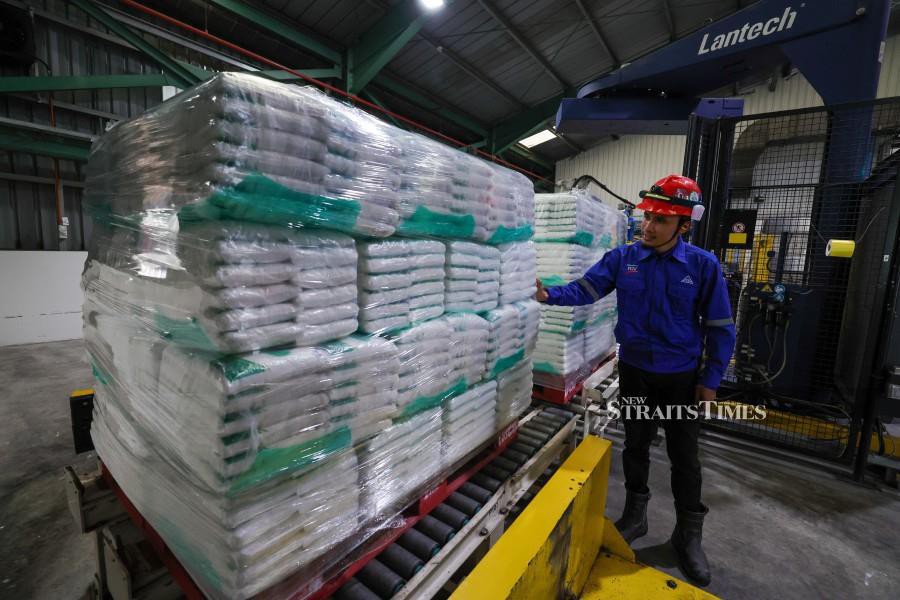KUALA LUMPUR: The Domestic Trade and Cost of Living Ministry is monitoring the development of the global sugar market and its impact on the local supply and price.
Its minister Datuk Armizan Mohd Ali said the stability in the supply of imported raw sugar and sustainability of the local processed sugar supply chain should be given attention, especially at a time when the country depends 100 per cent on imported raw sugar.
"The direction of the local sugar industry and supply chain needs to be seen not only at the price of sugar in the local market.
"For the past few years, the world has been dealing with the issue of raw sugar prices rising ever higher. Even more worrying is the risk of a global sugar supply shortage," he said after a meeting recently.
Industry observers said Malaysia will have to rely entirely on imported sugar if the local sugar industry is no longer viable.
"Therefore, the local sugar will be determined by the world market price which is much higher than the price of sugar processed and sold in the country now," said Wan Mohd Farid Wan Zakaria, a senior lecturer at UiTM's Faculty of Management & Business.
"When we are completely dependent on supplies from outside for basic goods in the country, we also need to take into account if there is instability and disruption of the world's supply chain, and the risk if supplier countries limit their exports to give priority to their respective domestic markets," he added.
Wan Mohd Farid said given the high dependence on imports, a weak ringgit will further increase the risk of being exposed to higher sugar prices.
So the steps the government takes in dealing with the price of sugar need to take into account the short and long-term effects, he said.
Merely RM1 increase since a decade ago
The local sugar production is facing increasing challenges despite maintaining reasonable consumer prices for years.
The retail price of sugar had edged up by only one sen over the past decade, from RM2.84 per kg in 2013 to RM2.85 per kg now.
Contrary to popular belief, sugar is not subsidised by the government.
Malaysia has the lowest retail price of sugar in Asean and among the lowest in the world, at RM2.85 per kg.
This is much lower than other Asean countries, such as the Philippines where sugar is sold at RM8.53 (105 pesos) per kg, and Myanmar at RM6.41 (3,000 kyat) per kg.
Price control
However, the low controlled price set by the government is now squeezing sugar producers as production costs have increased significantly in recent times.
With the increase in global sugar prices due to deficits and high transportation and oil costs, the average cost of producing sugar is now much higher than the price at which companies can sell it.
This has resulted in significant losses for every kilogramme of sugar sold by sugar producers.
Rakyat's complaints
Amid public anger over the government's move to implement cuts in subsidies, the request to increase the price of sugar by the producing companies certainly received a negative reaction.
This annoyance and anxiety is understandable because all of the government's measures, however rational they are to benefit the B40 group, translate as "price hikes''.
Risk of bankruptcy
But the reality here is that sugar producers face the risk of losses, or worse bankruptcy.
MSM Malaysia Holdings Bhd reportedly suffered a loss of 88 sen for every 1kg of sugar produced, following the increase in world raw sugar prices which are currently at US$21.7 per tonne.
The country's main sugar producing company has been operating at a loss for the past two years with the latest, a loss of RM36 million for the third quarter of 2023.
This simple math tells us: a company that keeps losing money will eventually go out of business. When local companies no longer exist, foreign imports are forced.
Bailout?
Skeptics have said any justification for the government to raise the price of sugar is simply to save sugar producing companies.
The sound is really good, sweet and solid. But raising prices is not just about survival of sugar companies, industry observers said.
It is also to avoid eventually having to import sugar from foreign countries. If this happens, the price will not be cheaper.
Even now, Malaysia is importing raw sugar from Brazil after the world's main sugar producing countries, Thailand and India froze their respective sugar exports.
Household sugar consumption averages 2.6kg per month, with per capita consumption at 42kg annually, including industrial consumption.
It's true that a higher sugar price may affect the prices of processed food. That is a similar domino effect when the price of flour goes up.
But from a health point of view, industry observers said it is expected to have a positive effect - people will reduce sugar intake in their food and drinks, as well as cut the risk of diabetes which is one of the most common diseases affecting Malaysians.
Food security
Malaysia now has to rely on sugar imports from Brazil because our country no longer has raw sugar production farms.
The Chuping sugarcane plantation in Perlis was closed in 2012, requiring the country to replace it with a new, larger one immediately.
